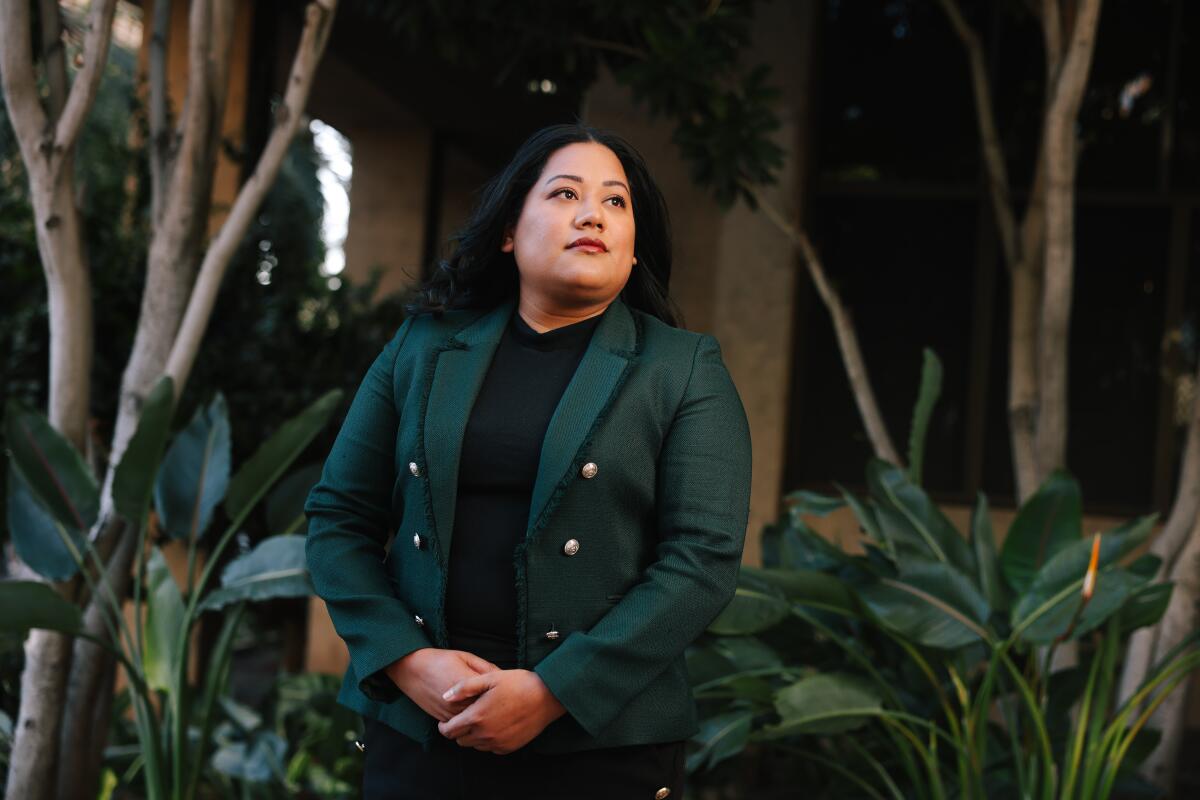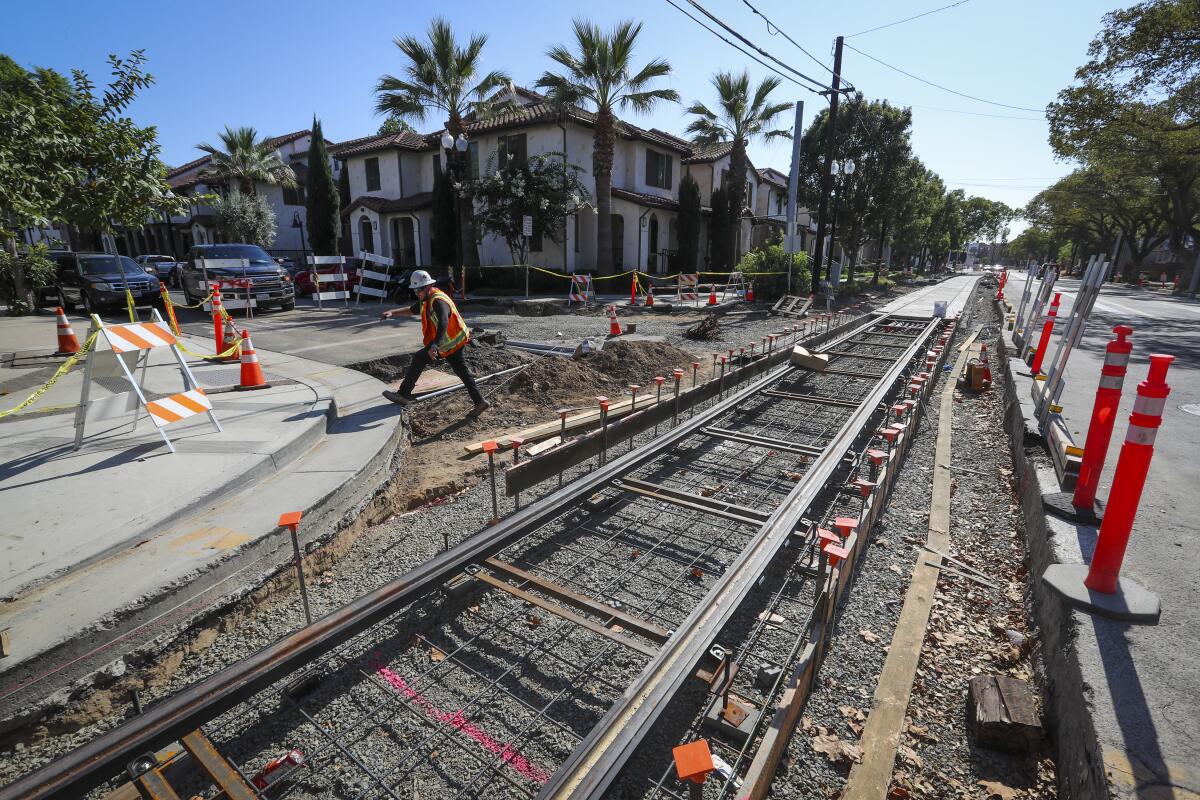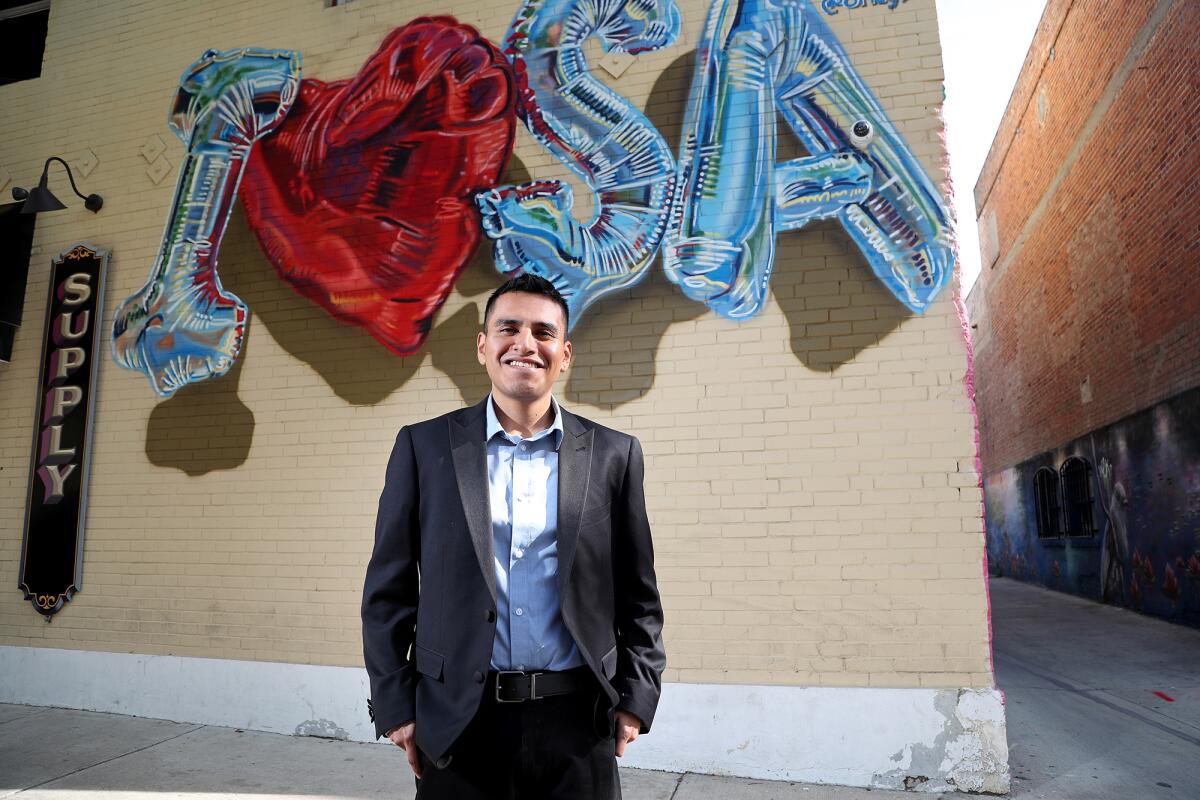Column: A failed recall heralds a new era for Latino politics in Orange County

- Share via
On a typical evening, Chato’s Bar and Grill in downtown Santa Ana serves not-bad Mexican food and cocktails to a half-empty dining room. On Nov. 14, the line was out the door — but tacos and tequila were the last thing on everyone’s mind.
Supporters of Santa Ana Mayor Pro Tem Jessie Lopez were ready to party. For months, they had knocked on doors in Lopez’s district in the northern, wealthier part of the city, fighting a recall against her.
Critics, fueled by nearly $800,000 from real estate groups and the city’s powerful police union, painted Lopez as an out-of-touch radical because she had voted for rent control and a civilian police oversight commission. Lopez, 34, who is in her first term, was one of four unabashed progressives on the council and seen as the easiest one to take out.
Despite being outspent 8-1, Lopez beat back the recall by a decisive 56% to 43%. That’s why election night at Chato’s was as joyous as any gathering I’ve seen in covering Santa Ana politics for nearly as long as many of Lopez’s young volunteers have lived.
Supporters were mostly Latino but also white, Black and Vietnamese. College students mixed with senior citizens. Artists stood alongside small-business owners. Lifelong friends of Lopez hugged constituents who had voted against her in 2020 but were won over by the council member’s attention to meat-and-potato issues like broken streetlights and traffic. Even police officers showed up to pay respects.
Giddy speaker after giddy speaker took turns on a stage where a DJ would usually be spinning tracks.
“They tried to trample over our rights,” declared Orange County Supervisor and former Santa Ana Mayor Vicente Sarmiento to the roaring crowd. “Now, we say, ‘You can’t buy these elections. You can’t buy us off. Santa Ana is not for sale,’ ” pronouncing the city “SanTana” the way locals do.
Los Angeles members of the Working Families Party, which counts Lopez as a member, drove down. So did Cudahy councilmember Elizabeth Alcantar, who met Lopez while the two attended Long Beach State. Everyone knew history had been made that night — even if they didn’t grasp the full scope of what had happened.
Recall proponents, who included Mayor Valerie Amezcua and councilmember Phil Bacerra, have yet to publicly speak about the results. They should rue the choice to let hundreds of thousands of dollars in negative mailers make their anti-Lopez argument for them, instead of putting in the legwork like the winning side did.
I didn’t write about the recall until now, because my wife has done catering for the city within the past year. But I followed it closely, because it’s a bellwether for Latino politics in Orange County.
Twenty years ago, another progressive Santa Ana elected official named Lopez faced a well-funded recall. That was the late Nativo Lopez, a pioneering Chicano activist and Santa Ana Unified School District trustee who helped kick-start Orange County’s purple-politics transformation in the mid-1990s by registering tens of thousands of Latinos to vote. He wanted to start a political dynasty, but his arrogant ways, cronyism and raza-first mentality made him anathema to the city’s ruling class. A recall against him in 2003 passed with 70% of the vote, and he never held office again.
His crushing defeat largely scared off progressive-leaning Latinos from running for office in Orange County for a generation. In Santa Ana, activists tilted at political windmills as moderate council members — almost all Latino Democrats — passed policies that gave away city property to developers, encouraged gentrification and handed out fat raises to the police department, whose union subsequently spent millions of dollars to help their preferred candidates stay in power or take out the ones they didn’t like.
Those days seemed like long-ago history at Lopez’s celebration.

Since she took office in 2020, the Santa Ana city council has passed the aforementioned rent control ordinance (the only one of its kind in Orange County) and established a permanent fund to help residents fight deportation. Last month, the council put a measure on the 2024 ballot allowing noncitizen residents the right to vote in municipal elections, which would be a first in California if it passes.
“At the end of the night, I pulled aside Jessie and told her, ‘It may not sink in tonight, but you’re part of a very long journey,’” Sarmiento told me a few days later. “‘People lost seats and races, and paved the path for this moment for you. You stand on the shoulders of a bunch of people who gave up a lot.’”
“The energy of that room was so incredibly impactful, and I hope it stays that way,” Lopez said in a phone interview before heading off for a deserved break. “What I saw that night, I know I’ll never forget it.”
Santa Ana’s progressive swing is part of a Southern California trend of young Latinos taking on their liberal elders, the way Los Angeles councilmember Eunisses Hernandez upset then-incumbent Gil Cedillo last year. Indeed, Hernandez connected Lopez to volunteers and donors, a fact that Lopez’s opponents put on attack mailers alleging that L.A. wokosos were infiltrating Orange County.
In fact, homegrown activists have been planning for a takeover of Santa Ana politics for years. They’re people I’ve known for seemingly forever, folks who were long proud to not be involved in the vendido world of politics but fell into it out of frustration.

Lopez, for example, got involved in the fight over Willowick Golf Course, a 102-acre greenspace that is in Santa Ana but owned by the city of Garden Grove. Santa Ana officials have long wanted to develop the land, but people who live near Willowick organized to ensure that they would have a say.
“We presented the Garden Grove and Santa Ana city councils with [resident] surveys” around 2019, the council member said. “They rejected that information. They didn’t want to meet with us. They didn’t even respond to our emails.”
Soon after, Lopez volunteered for the Santa Ana Unified trustee campaign of Carolyn Torres, whom I first met in the early 2010s while she was fighting gang injunctions in Santa Ana as a member of the group Chicanos Unidos.
“We were always told by politicians, ‘You can be activists, but you can’t be in electoral politics,’” said Torres, who now presides over a progressive majority as board president. “But when I started seeing that we kept hitting this wall to convince decision-makers of our things — even allies who didn’t want to go on a ledge — I knew we had to run.”
Endorsing Lopez and Torres was Chispa, a nonprofit headed by 31-year-old Hairo Cortes. I first saw him in action as a college student getting arrested for protesting deportations. He also was skeptical of politics until 2016, when police union-backed council candidates trounced two activist friends.
“It was our ‘aha’ moment,” he said. His voice was still hoarse from Lopez’s election night party. “We thought, ‘We gotta invest in an electoral strategy. We don’t know what the f— that means, but we’ll learn.’”
Chispa — which can endorse political candidates and issues as a 501(c)(4)-registered nonprofit — united with other groups to plot out a playbook. They made sure not to just make it a Latino thing, Cortes said, since “we can’t win at the expense of other communities. That’s not winning.”
Another part of their strategy was having Chispa policy director Bulmaro “Boomer” Vicente run for assembly in 2022. He got only 15% of the vote in the primary and failed to make the general election.
But “by losing, he learned a bunch of things” to help keep Lopez in office, Cortes said. “How to run races on a bigger scale, and sophistication that we’re not used to. Why shouldn’t a city council candidate run it like that? That foo’ learned how to fundraise!”
Cortes, Vicente, and others partied deep into the night and continued into the early morning. The plan for 2024 is for Lopez and Torres to run for reelection, while their supporters volunteer on their races and others to maintain progressive majorities on the city’s council and school board. The hope is that from Santa Ana, the historical stronghold for Latino politics in Orange County, this new template for victory can spread.
“Jessie winning is huge,” Torres said. “The whole ‘These leftists coming in here is a thing that’s not going to be deep’ — that’s done. Campaign season after campaign season, it’s clear what the community wants.”
More to Read
Sign up for Essential California
The most important California stories and recommendations in your inbox every morning.
You may occasionally receive promotional content from the Los Angeles Times.











